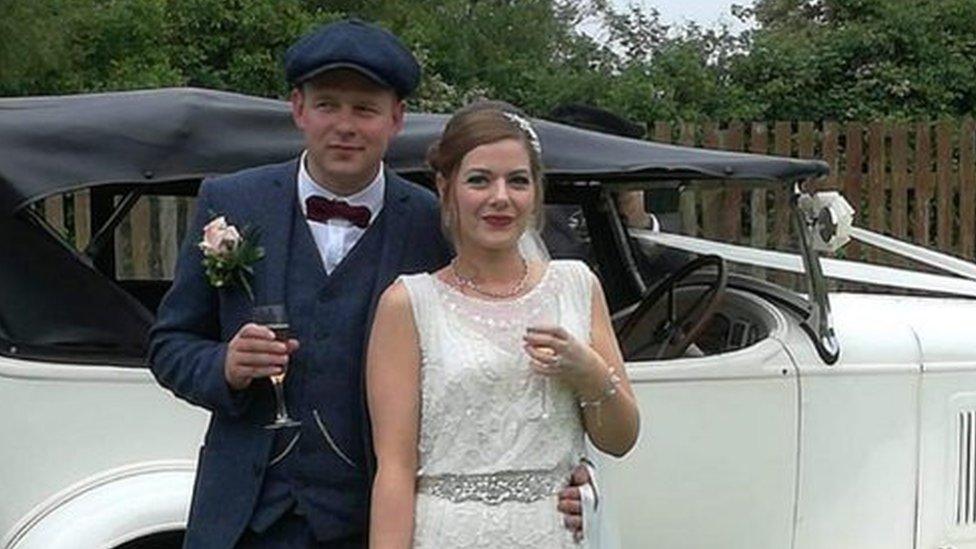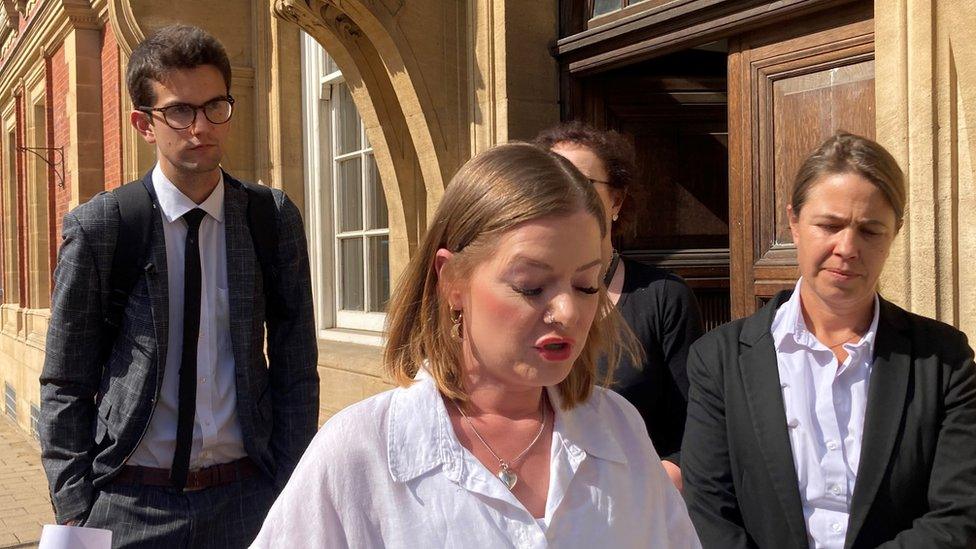Luke Ashton death: Coroner condemns 'inadequate' gambling protections
- Published

Luke Ashton took his own life in April 2021
A coroner has called for a betting company to take action to prevent further deaths after a gambling addict took his own life.
Luke Ashton, 40, of Leicester, died in 2021, with gambling debts of £18,000.
Coroner Ivan Cartwright has now said in a report Betfair and parent company Flutter should follow "best practice" instead of "industry standards" to prevent harm to gamblers.
The firm, which has 56 days to respond, said it had already made some changes.
The coroner's prevention of future deaths report has been published after an inquest last month concluded Mr Ashton's death in April 2021 was as a result of a gambling disorder.
Mr Cartwright also expressed concerns at the inquest that Betfair missed opportunities to "intervene meaningfully" after Mr Ashton's gambling spiked.
'I remain concerned'
Mr Ashton placed 1,229 bets in March 2021, and during one day of that month, he deposited £2,500, the inquest at Leicester Town Hall was told.
In his report, Mr Cartwright said: "I remain concerned that the player protection tools, as mentioned above, were and are inadequate to protect a person such as Mr Ashton, who was a problem gambler with a worsening problem; specifically that such tools do not amount to any or any meaningful interaction with the gambler, or any intervention into the practices of the gambler.
"I remain concerned that the algorithm devised and operated by Betfair to assist its staff in, amongst other things, observing and monitoring the gambling patterns and practices of its customers failed to flag up Mr Ashton as a problem gambler.
"[This is] despite the increases in his time online, the value of his deposits and the size of his losses, in part because his gambling practices, even in the last 10-12 weeks of his life, were deemed not to be exceptional, when averaged among gambling customers generally.
"I remain concerned that, as was apparent through the evidence of a senior employee witness during the course of the inquest, the operator Betfair appears to judge the extent of its responsibilities to gambling customers solely with regard to industry [regulatory] standards, rather than current good or best practice in order to prevent further harming problem gamblers, or those who, as a result of their changing practices and patterns are likely to become problem gamblers."

Mrs Ashton successfully pressed for the inquest to consider wider questions of betting safeguards
Copies of the coroner's report have also been sent the Gambling Commission and Lucy Frazer MP, Secretary of State for Culture, Media and Sport.
The inquest into Mr Ashton's death was thought to be the first in the UK in which a gambling company was named as an "interested party".
Betfair told the hearing it used a computer algorithm to monitor customer betting and that Mr Ashton was deemed "low risk".
The company said its algorithm found nothing in his betting patterns to trigger human intervention that might have restricted his gambling.
Instead, Mr Ashton was sent eight automated and generic "awareness" emails by the company.

Mrs Ashton said it was important to know gambling addiction could "happen to anyone"
Richard Clarke, its managing director of customer relations, told the inquest: "We have looked very carefully at the actions we took and we are confident we met the regulatory standard at the time."
Following the inquest, Mr Ashton's wife Annie told the BBC she would never stop campaigning for tougher regulation.
"I wanted accountability, but I also wanted people to know how much of a normal person Luke was and how this could happen to literally anyone," she said.
"I think I am achieving that; I think the stigma is being broken down.
"I want people to be able to speak about it because Luke felt like he couldn't."
A spokesperson for Flutter said it noted the coroner's report and would respond formally, but that a customer in Mr Ashton's circumstances would be unable to repeat the same betting patterns, due to improvements made since early 2021.
These include a monthly net deposit limit based on a telephone assessment with customers, who cannot change the limit, and financial vulnerability checks.
The spokesperson said: "Flutter UKI is committed to creating an environment for customers to enjoy our products in a safe and sustainable way and we hold ourselves to the highest standards in the industry.
"We have made significant changes to our controls since 2021 and will, of course, incorporate additional learnings from this tragic case into our systems and processes.
"We wish to reiterate our sincere condolences to Mrs Ashton and her family. We are truly sorry for their loss."
The Gambling Commission also said it would respond to the coroner's report.
"As the gambling regulator we will continue to monitor compliance, take enforcement action, clamp down on irresponsible products, update our policies and guidance in line with best practice and challenge the industry to make sure operators are interacting with customers and identifying early signs of harm," a spokesperson said.
New government proposals to regulate the gambling sector were published in a white paper in April.
It suggested a consultation on stake limits of between £2 and £15 per spin for online slots machines, and gamblers losing large amounts of money facing checks.
The Gambling Commission said it was "in the process" of implementing the government recommendations.
"As part of this we will be consulting on safety measures to ensure bonus offers and incentives do not lead to excessive or harmful gambling, set further product controls for safer online games and require operators to identify and take action for financially vulnerable consumers, and to tackle significant unaffordable gambling through frictionless checks that are not disruptive for consumers," the spokesperson added.

If you have been affected by any of the issues in this story, you can visit the BBC Action Line for help.

Follow BBC East Midlands on Facebook, external, on Twitter, external, or on Instagram, external. Send your story ideas to eastmidsnews@bbc.co.uk, external.
- Published13 July 2023

- Published29 June 2023

- Published14 June 2023
